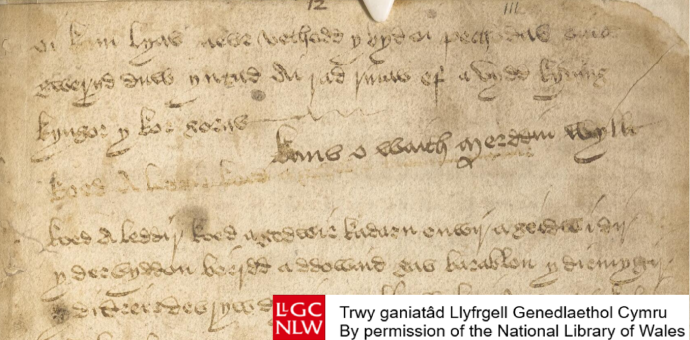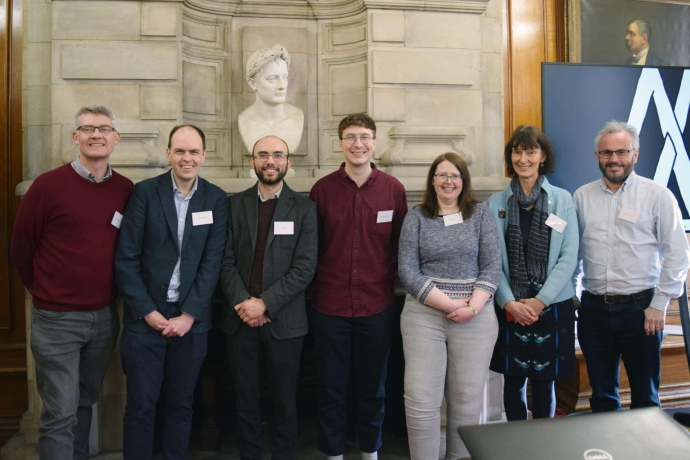Merlin Speaks Through the Ages: new digital editions bring his later poetry to life
A new website is bringing to light a long-overlooked body of poetry attributed to Merlin, revealing his role as a prophetic voice commenting on the Tudor succession, the turmoil of the Civil Wars, and even environmental concerns.

The end of a poem in the voice of Myrddin Wyllt (‘Merlin the Wild Man’), recorded in Peniarth 26 by the fifteenth-century poet Gutun Owain.
The recently launched Myrddin Poetry Project website presents new editions and translations of these poems, offering unprecedented access to their historical and literary significance. Funded by the UKRI Arts and Humanities Research Council (AHRC), the Merlin Poetry Project is a collaboration between Cardiff University, the University of Wales Centre for Advanced Welsh and Celtic Studies (CAWCS), and Swansea University.
At CAWCS, Professor Ann Parry Owen and Dr Jenny Day have been studying these later Merlin poems, a relatively obscure yet rich literary tradition that is now being made widely available for the first time.
The project’s work has demonstrated that prophetic poetry attributed to Merlin was still being composed in Wales in the fifteenth, sixteenth and seventeenth centuries and that a variety of concerns are expressed. Merlin, it seems, was envisaged as taking an interest not only in the Tudor succession and the turmoil of the later Civil Wars, but also in the hardship caused by excessive taxes, social problems and climate issues. In one poem he laments ‘the failure of the vines of the vineyards and the corruption of the earth and the early trees and the crops’, and in another there is concern that after the ‘two Harry’s’ (Henry VII and Henry VIII) there would be ‘no one further of the blood’.
Another major finding of the project has been the dynamic, changeable nature of the later poems. Dr Jenny Day explains, ‘We often find the same poem occurring in multiple versions and being reinterpreted and adapted in different periods. Even the boundary between poetry and prose is fluid: a poem might incorporate extracts from a prose prophecy, and a prose prophecy may suddenly break into rhyme!’
One thing that is fairly constant is the persona of Merlin: he tends to be not the Arthurian Merlin, but rather the Merlin of the ‘Old North’ of Britain who suffered trauma in the battle of Arfderydd and went to live close to nature in the forest of Celidon, where he was visited by his sister Gwenddydd.”
The Myrddin Poetry Project website is already available in Beta form, and more poems will be added over the coming months. It builds upon the successful model of the gutorglyn.net website which was developed as part of a previous AHRC-funded collaboration between CAWCS and Swansea University, ‘The Poetry of Guto’r Glyn’. For the Merlin poems, we have developed a new structure for presenting the multiple and changeable versions, and have added searchable databases for prophetic themes and symbols as well as personal names and place names.
The project, which officially came to an end on 28 February, was led by Principal Investigator, Dr Dylan Foster Evans from the School of Welsh, Cardiff University, with three Co-Investigators, Dr David Callander from the School of Welsh, Cardiff University; Professor Ann Parry Owen from the Centre for Advanced Welsh and Celtic Studies and The Dictionary of the Welsh Language; and Mr Alexander Roberts from Swansea University. Dr Jenny Day (CAWCS), Dr Llewelyn Hopwood ( the School of Welsh, Cardiff University) and Dr Ben Guy (formerly at the School of Welsh, Cardiff University, now at the Department of Anglo-Saxon, Norse and Celtic, University of Cambridge) were researchers on the project.
Professor Ann Parry Owen commented, “Working with our research partners in Cardiff and Swansea has been a privilege for us at CAWCS, building on our previous experience in editing medieval Welsh poetry. The poems attributed to Myrddin offered us many challenges and problems, and it was an honour to collaborate on the texts to create an exciting and innovative digital edition, which will be freely available to everyone”.
Professor Elin Haf Gruffydd Jones, Director of CAWCS, added, “I would like to congratulate our colleagues at CAWCS and at Cardiff and Swansea universities on their outstanding research which offers new interpretations of Merlin’s poetry and presents them in digital, scholarly and accessible ways. We look forward to further collaboration between our organisations”.
Dr David Callander, from Cardiff University, highlighted the significance of the project, “The legend of Merlin is a massive part of Welsh and British culture. But there is still so much more to be discovered. Being able to read and take insights from literature that was written hundreds of years ago gives us the chance to connect more deeply with our heritage, as well as showing the world a rich literary history that we can be proud of.”

Notes for Editors
Contact: Dr Angharad Elias (Admin Officer) a.elias@wales.ac.uk
1. The Centre for Advanced Welsh and Celtic Studies (CAWCS) was established by the University of Wales in 1985 as a dedicated research centre conducting team-based projects on the languages, literatures, culture and history of Wales and the other Celtic countries. It is located in Aberystwyth, adjacent to the National Library of Wales, which is an internationally-renowned copyright library with excellent research facilities. This year CAWCS will celebrate its fortieth anniversary with a conference held at the National Library of Wales, Aberystwyth, on 17–19 September 2025: Gorwelion: International Conference | University of Wales
2. CAWCS offers unique opportunities for postgraduate students to work alongside specialists in a dynamic and supportive environment. We welcome enquiries about MPhil/PhD topics in any of our research areas. For more information about research opportunities, or for an informal chat about possible topics, contact our Head of Graduate Studies, Dr Elizabeth Edwards: e.edwards@wales.ac.uk
3. CAWCS is the home of the Dictionary of the Welsh Language, which is celebrated its centenary in 2021: https://www.welsh-dictionary.ac.uk/
Further Information
Arwel Lloyd
Principal PR and Communications Officer
Corporate Communications and PR
Email: arwel.lloyd@uwtsd.ac.uk
Phone: 07384 467076
